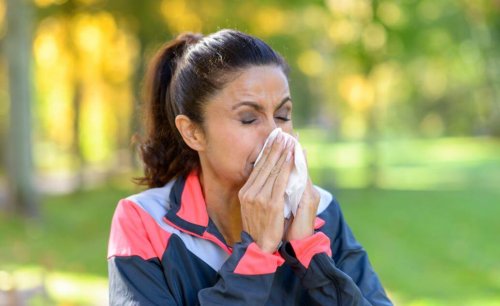Should You Exercise When You Have a Cold?

A common question among fitness fanatics is whether it’s a good idea to exercise while you have a cold. The answer is that it depends on two things. These are the symptoms you have, and the amount of exercise you intend to do.
Should I exercise when I have a cold?
There are many differing opinions regarding this question. Some experts advise that you should rest until you feel better. On the other hand, others assert that exercising is the best way to eliminate the virus. The truth is that both of these pieces of advice are acceptable and true depending on the circumstances.
It’s true that exercising or playing sports can help you combat the virus that caused you to get the cold. That’s because, among other things, it helps strengthen your immune system.

Your white blood cells are responsible for defending your body from viruses and bacteria. When you exercise, they flow more quickly through your bloodstream. This translates to being able to fight off infections more quickly.
On the other hand, you also have the option of resting until you feel better. The immune system needs the body to be rested and free from stressful situations in order to work at its best level. In this state, it can recover its strength more effectively.
When is it appropriate to exercise during a cold and when is it not?
You can safely exercise when the symptoms of your cold are light and tolerable. This is the case when your symptoms only include sneezing, congestion, or throat pain. If the symptoms are light and you otherwise feel fit enough, there’s no problem.
Your cold symptoms might be more severe or intense. For example, you might be coughing, have a fever, or feel chest congestion, abdominal discomfort, fatigue, or muscular pain. In such cases, it’s not appropriate to engage in any sort of sports or exercise sessions.
Above all, it’s counterproductive to exercise when you have a fever. Doing so could result in dehydration. If you have a fever, experts recommend you rest and eat a nutritional diet. This will help you recover and feel better.
How much exercise is appropriate?
Regular and moderate exercise strengthens your immune system. This is especially true when you combine your exercise routine with good nutrition, adequate amounts of rest, and low levels of stress. Most of the time, daily physical activity or exercising several times a week are beneficial for your health.
On the other hand, if your exercise sessions are intense and extreme, the effects on your immune system can be negative. If this is your situation, then we recommend you avoid intense activities. Strenuous exercise could reduce your white blood cell count. That would weaken your immune system.
You should evaluate the amount of sport or exercise you engage in along with the symptoms of the cold. Experts recommend that you don’t become involved in demanding activities even when your symptoms are minimal. This will facilitate a faster and more effective recuperation process.
Keep yourself warm
If the temperatures are low and you have a cold, experts recommend you use a thermal shirt. Such clothes keep your body heat and absorb your sweat. If it’s very cold, some good advice is to wear thin layers of clothing, rather than one single, thicker one. It’s important to keep warm, but not too warm.

Cover your nose and throat
When it’s cold, you should cover your nose and mouth. That’s because these are unprotected areas where you breathe in cold air directly. It’s also a good idea to cover your throat and your head, as well as wearing gloves.
Stretching and warming up: essential matters
If you have symptoms of a cold, it’s essential that you warm up appropriately before starting with the exercise. Most importantly, you should take everything gradually. When you finish the activity, it’s best to stretch well while you’re still dressed for warmth. You can finish everything off with a hot shower.
Adequate nutrition and hydration
Having a cold or the flu accelerates dehydration. That’s why it’s essential to drink a lot of water even if you’re not thirsty. To support your exercise routine, you should maintain a good diet that’s rich in carbohydrates, vitamins, and minerals.
In conclusion, sport and physical activity are extremely important for your body to stay healthy. That being said, if you’re experiencing a cold, you have to evaluate your symptoms to decide whether or not it’s a good idea to exercise at that point.
A common question among fitness fanatics is whether it’s a good idea to exercise while you have a cold. The answer is that it depends on two things. These are the symptoms you have, and the amount of exercise you intend to do.
Should I exercise when I have a cold?
There are many differing opinions regarding this question. Some experts advise that you should rest until you feel better. On the other hand, others assert that exercising is the best way to eliminate the virus. The truth is that both of these pieces of advice are acceptable and true depending on the circumstances.
It’s true that exercising or playing sports can help you combat the virus that caused you to get the cold. That’s because, among other things, it helps strengthen your immune system.

Your white blood cells are responsible for defending your body from viruses and bacteria. When you exercise, they flow more quickly through your bloodstream. This translates to being able to fight off infections more quickly.
On the other hand, you also have the option of resting until you feel better. The immune system needs the body to be rested and free from stressful situations in order to work at its best level. In this state, it can recover its strength more effectively.
When is it appropriate to exercise during a cold and when is it not?
You can safely exercise when the symptoms of your cold are light and tolerable. This is the case when your symptoms only include sneezing, congestion, or throat pain. If the symptoms are light and you otherwise feel fit enough, there’s no problem.
Your cold symptoms might be more severe or intense. For example, you might be coughing, have a fever, or feel chest congestion, abdominal discomfort, fatigue, or muscular pain. In such cases, it’s not appropriate to engage in any sort of sports or exercise sessions.
Above all, it’s counterproductive to exercise when you have a fever. Doing so could result in dehydration. If you have a fever, experts recommend you rest and eat a nutritional diet. This will help you recover and feel better.
How much exercise is appropriate?
Regular and moderate exercise strengthens your immune system. This is especially true when you combine your exercise routine with good nutrition, adequate amounts of rest, and low levels of stress. Most of the time, daily physical activity or exercising several times a week are beneficial for your health.
On the other hand, if your exercise sessions are intense and extreme, the effects on your immune system can be negative. If this is your situation, then we recommend you avoid intense activities. Strenuous exercise could reduce your white blood cell count. That would weaken your immune system.
You should evaluate the amount of sport or exercise you engage in along with the symptoms of the cold. Experts recommend that you don’t become involved in demanding activities even when your symptoms are minimal. This will facilitate a faster and more effective recuperation process.
Keep yourself warm
If the temperatures are low and you have a cold, experts recommend you use a thermal shirt. Such clothes keep your body heat and absorb your sweat. If it’s very cold, some good advice is to wear thin layers of clothing, rather than one single, thicker one. It’s important to keep warm, but not too warm.

Cover your nose and throat
When it’s cold, you should cover your nose and mouth. That’s because these are unprotected areas where you breathe in cold air directly. It’s also a good idea to cover your throat and your head, as well as wearing gloves.
Stretching and warming up: essential matters
If you have symptoms of a cold, it’s essential that you warm up appropriately before starting with the exercise. Most importantly, you should take everything gradually. When you finish the activity, it’s best to stretch well while you’re still dressed for warmth. You can finish everything off with a hot shower.
Adequate nutrition and hydration
Having a cold or the flu accelerates dehydration. That’s why it’s essential to drink a lot of water even if you’re not thirsty. To support your exercise routine, you should maintain a good diet that’s rich in carbohydrates, vitamins, and minerals.
In conclusion, sport and physical activity are extremely important for your body to stay healthy. That being said, if you’re experiencing a cold, you have to evaluate your symptoms to decide whether or not it’s a good idea to exercise at that point.
This text is provided for informational purposes only and does not replace consultation with a professional. If in doubt, consult your specialist.








